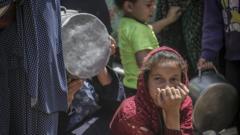In a recent interview, the head of the UN Relief and Works Agency for Palestine Refugees in the Near East (UNRWA) expressed grave concerns over the humanitarian crisis in Gaza, where civilians are facing extreme hunger due to the continuation of the Israeli blockade and military actions. This statement comes amidst escalating warfare that has seen significant civilian casualties and displacement, with Palestinians caught in a web of violence and deprivation.
For over two months, the blockade has restricted essential supplies, leaving the population desperate and malnourished. The IPC’s latest reports indicate that more than two million Gazans are experiencing acute food insecurity, with particularly alarming figures suggesting that 470,000 are in a state classified as "catastrophe," facing starvation.
Philippe Lazzarini, UNRWA's Commissioner-General, noted that the situation has deteriorated drastically, pointing out that starvation is spreading among the population. He stated, “We can expect that in the coming weeks, people will not die because of bombardments, but due to the lack of food,” emphasizing that the denial of aid is being used as a military strategy. The humanitarian crisis has put an enormous strain on the already limited resources, with the UN and other aid organizations repeatedly calling for an end to the blockade.
Israel maintains that preventing aid from reaching Gaza's civilians is part of a broader strategy to weaken Hamas, yet many international actors view this as a systematic denial of basic human rights. Furthermore, the international community's response, which has often been marked by inaction, has come under scrutiny, as the notion shifts toward the potential implications of genocide arising from prolonged suffering in Gaza.
The recent military actions undertaken by Israel are said to be a reaction to ongoing tensions, yet the implications for the civilian population remain dire. As Israeli leadership continues to push for military offensives, international commentators and humanitarian workers warn that the consequences could lead to unprecedented levels of hunger and malnutrition, raising questions about accountability and the moral implications of warfare strategies employed.
In light of these developments, calls for urgent humanitarian access and the protection of civilians within Gaza have never been more pressing, as the world watches with bated breath to see whether a peaceful resolution can be achieved amidst the chaos and destruction.
For over two months, the blockade has restricted essential supplies, leaving the population desperate and malnourished. The IPC’s latest reports indicate that more than two million Gazans are experiencing acute food insecurity, with particularly alarming figures suggesting that 470,000 are in a state classified as "catastrophe," facing starvation.
Philippe Lazzarini, UNRWA's Commissioner-General, noted that the situation has deteriorated drastically, pointing out that starvation is spreading among the population. He stated, “We can expect that in the coming weeks, people will not die because of bombardments, but due to the lack of food,” emphasizing that the denial of aid is being used as a military strategy. The humanitarian crisis has put an enormous strain on the already limited resources, with the UN and other aid organizations repeatedly calling for an end to the blockade.
Israel maintains that preventing aid from reaching Gaza's civilians is part of a broader strategy to weaken Hamas, yet many international actors view this as a systematic denial of basic human rights. Furthermore, the international community's response, which has often been marked by inaction, has come under scrutiny, as the notion shifts toward the potential implications of genocide arising from prolonged suffering in Gaza.
The recent military actions undertaken by Israel are said to be a reaction to ongoing tensions, yet the implications for the civilian population remain dire. As Israeli leadership continues to push for military offensives, international commentators and humanitarian workers warn that the consequences could lead to unprecedented levels of hunger and malnutrition, raising questions about accountability and the moral implications of warfare strategies employed.
In light of these developments, calls for urgent humanitarian access and the protection of civilians within Gaza have never been more pressing, as the world watches with bated breath to see whether a peaceful resolution can be achieved amidst the chaos and destruction.











